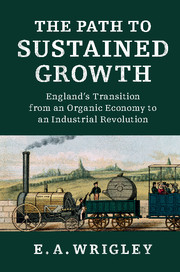 The Path to Sustained Growth
The Path to Sustained Growth Book contents
- Frontmatter
- Dedication
- Contents
- List of figures
- List of tables
- Acknowledgements
- Introduction
- 1 Organic economies
- 2 The classical economists
- 3 Energy consumption
- 4 Urban growth and agricultural productivity
- 5 Changing occupational structure and consumer demand
- 6 Demography and the economy
- 7 Transport
- 8 England in 1831
- 9 The completion of the industrial revolution
- 10 Review and reflection
- Bibliography
- Index
10 - Review and reflection
Published online by Cambridge University Press: 05 January 2016
- Frontmatter
- Dedication
- Contents
- List of figures
- List of tables
- Acknowledgements
- Introduction
- 1 Organic economies
- 2 The classical economists
- 3 Energy consumption
- 4 Urban growth and agricultural productivity
- 5 Changing occupational structure and consumer demand
- 6 Demography and the economy
- 7 Transport
- 8 England in 1831
- 9 The completion of the industrial revolution
- 10 Review and reflection
- Bibliography
- Index
Summary
The term ‘industrial revolution’ has had a wide currency for many decades. It can be misleading in that the changes taking place were not found solely in industry, nor were they always induced by a prior stimulus brought about through industrial advance. The term is, nonetheless, in all probability, through long usage, here to stay. Perhaps because of the inadequacy and ambivalence of the term ‘industrial revolution’, it has proved difficult to secure agreement on when it should be regarded as having been completed.
If a single, symbolic date is sought to mark the completion of the industrial revolution it might, in my view, be that of the Great Exhibition of 1851. Although the employment of the steam engine as the prime source of mechanical energy was only partially completed at this date, it was already clear that mechanical energy needs no less than heat energy needs could be met by burning coal. Two or three decades were to elapse before virtually all the industries which used mechanical energy on a considerable scale were securing their supply from the steam engine, but it was already clear at the time of the Great Exhibition that this change was under way. The rail network in Britain had already transformed inland transport and was in the process of radically revising the economic geography of the country. Further, the centuries during which there was a marked contrast between developments in England and on the continent had ended. Other countries were quick to realise where the future lay and to ensure that they were not left behind. It became clear that events in England had resulted in a ‘package’ of changes covering all major energy uses that it was both desirable and feasible to adopt elsewhere. Implementing the new ‘package’ involved changes that were largely technical rather than institutional and compatible with a wide range of different political and institutional structures. The ‘package’ was widely taken up in the second half of the nineteenth century, with striking results for the relative economic performance of Britain and her neighbours.
The first edition of Jevons’ The coal question was published in 1865.
- Type
- Chapter
- Information
- The Path to Sustained GrowthEngland's Transition from an Organic Economy to an Industrial Revolution, pp. 198 - 205Publisher: Cambridge University PressPrint publication year: 2016
